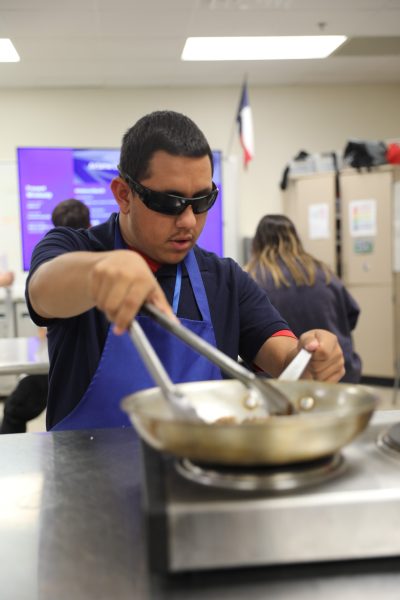What Angel Alderete (’24) enjoys most is working on his 1998 Z28 Camaro. Most days, he talks about oil changes, spark plugs, or tail lights. After he graduates from WHS in June, one of his goals is to get that Camaro up and running.
That would be a first since the car hasn’t moved in seven years. You can doubt Alderete all you want. Many do when they first see him navigating the halls, dark shades over his eyes, a cane in hand, his assistant teacher, Lisa Kolber, at his side, walking together to class.
Because he’s a fixture at WHS, most people know Alderete as just Angel – so we’ll call him that here.
Students know Angel is blind. What they may not know is that Angel suffers from Retinopathy of Prematurity. At birth, he weighed less than a pound. Doctors weren’t sure of his survival. Babies born at such a low weight experience a host of complications. For Angel, it was blindness.
Many blind students opt to attend a school with other blind students and are taught by specialty teachers. Angel didn’t. He attended an early childhood program at age three, and stayed in public schools, in Odessa. There were some difficulties, unfortunately.
“People were always fighting each other in crazy places, but that’s the normal over there,” Angel said. “They threw me in a life-skills class and just left me there. They did not teach me anything.” In his first year at WHS, Angel was paired with Kolber, who has taught school for nearly 20 years. After four years, the relationship is more than teacher and student.
“Angel was never the loud and out-going person he is now,” Kolber said. “When I first met him, he was really quiet and shy. I also had the chance to meet his family as well once I began working with him.”
Kolber had never worked with a blind student, so working with Angel was a new experience for her as well. They grew together since this was Angel’s first year in high school.
“I had to change my ways of teaching and adjust to working with Angel,” Kolber said. In her first meeting with Angel, they instantly clicked. Kolber and Angel met at the school before the year started to walk the hallways and learn the routes at the Ninth Grade Center. His orientation and mobility specialist also worked on his walking routes around the school.
“My first year in school was hard the first few months because I would have a hard time finding my classes,” Angel said. “Because all the students were around me and loud, I would get lost in the hallways.”
Angel’s long, white cane is his directional lifeline. He would sometimes get a little annoyed when students pushed him around and stepped over, on, or in the way of his cane. Kolber and other teachers who work with Angel have made a goal to teach him to advocate for himself so that when he graduates, he will become independent and care for himself without needing help.
In his culinary class, Angel is able to navigate the classroom kitchen by communicating with his team and practicing the layout of the room by gathering supplies and ingredients for his lab team every chance he gets. All students in Emily Bramhill’s class work hard to label the shelves and ensure that each piece of equipment is returned to its spot so everyone can depend on knowing where everything is.
“Angel was very successful in the pasta and baguette labs which re- quired the use of the sense of touch to determine when the dough was ready to rest, bake and shape,” Bramhill said. “While using the hot stations, Angel can successfully bring water or sauce up to a boil and down to a simmer by first using the dials and buttons on the stove which have braille coverings for him to feel for the correct button/dial and by listening to the sound of the water to determine a boil (fast humming sound) and a simmer (low humming sound) or not hot enough (no sound coming from the pot or hot steam rising.)”
Everyone also recognizes Angel by seeing him pass by with his saxophone on the way to pep rallies, and often wonder, “How is he able to play without music?”
Angel has been in the band since middle school. Aside from the obvious, what makes him stand out from the crowd is that he has learned how to play his saxophone by ear. Whenever Angel plays in class, he can keep up with the band and practice independently without mistakes.
He is close to most of his friends in the band because he sees them most days in rehearsals, in class, pep rallies, competitions, and during his favorite, football games.
“My experience with Angel has been great; I really enjoy being his friend,” said Luiz Mendoza (24’).
“He’s funny and really loud, basically the party of the saxophone section. Angel is very outgoing, and with his condition, he is really strong.”
Colton Weber (25’) said when he’s around Angel, “I feel happy. Angel always has a positive mood every day. He brings good energy into every room he walks in. Without him it would definitely feel empty.”
Landon Borries (25’) calls Angel “inspiring.” “I’m not a car person myself, but I enjoy talking about them with him,” said Borries. “It makes him happy. It’s always nice to hear about what he likes. He creates a very happy environment around himself. I’m sure that most of the saxophone section is very sad about him leaving, but I’m excited to see where he goes, and I would really like to see where he’s going to go in life.”


